2024 Kia Seltos First Drive: Refreshing an already competitive utility vehicle

NEWPORT, R.I. — A strong case could be made that the Kia Seltos wasn’t really in need of any significant updating. A nip here, a tuck there – bear in mind that we said in our last review of the 2023 model that “it’s a terrific little SUV that’s equal parts sensible and stylish” – and the Korean automaker’s smallest all-wheel-drive crossover would surely carry on winning hearts and finding its way into tens of thousands of driveways each year for the foreseeable future.
The fact that Kia saw fit to bestow the 2024 Seltos with a wide array of meaningful updates and improvements goes to show how important the rapidly expanding subcompact crossover segment is here in America. It’s not an off-road vehicle, despite the inclusion of all-wheel drive, but that just means it’s better equipped to deal with the actual lives of buyers who live in the land of the freeway and home of the pavement. It’s an urban runabout that’s big enough to feel reasonably well equipped for freeway slogs, and it’s got just enough ground clearance and traction that it will serve soft-roaders and camping couples quite well.
Thing is, all of that could be said of the 2023 edition, too. So what’s been done to improve the Kia Seltos for 2024?
There are minor tweaks to the Seltos’ front and rear styling for the new model year, but it remains a well-proportioned, chunky two-box design that instantly reads SUV, not wagon. The new-for-2024 X-Line model gets slightly darker trimmings, unique 18-inch wheels and a useful roof rack. All models gain restyled lighting units at each corner. The top-level Seltos SX gets its own 18-inch wheels while the base S and step-up LX get 17-inchers.
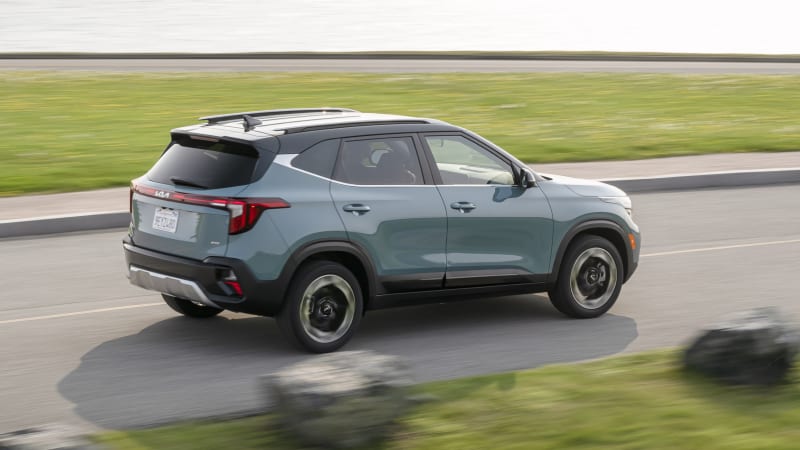
Inside, the interior has been rejiggered to feature a digital dash design with wide, horizontally positioned screens in front of the driver and extending toward the center touchscreen to house Kia’s well-designed infotainment system. Base LX models get a 4.2-inch instrument cluster bracketed by digital gauges and an 8-inch center screen. A larger and vibrant 10.25-inch instrument cluster and matching 10.25-inch center infotainment display come standard starting with the S trim. Android Auto and Apple CarPlay are standard.
We’re pleased that Kia has chosen to offer the 2024 Seltos with some fun colors inside and out. The Pluton Blue you see pictured here is a lovely shade in person, and it joins two other ocean- and sky-hued shades. There’s an attention-grabbing Mars Orange, an interesting Valais Green and even four different two-tone options. Inside, models equipped with the cloth and synthetic combo can be ordered in a blue and black mashup, and the higher trim levels with full SynTex gain brown and green options in addition to the standard black.
Nothing has changed when it comes to the Seltos’ interior or exterior dimensions. We’ve decided to label its segment midcompact since it sits halfway between subcompact and compact. It’s roomy enough for a couple, and has a back seat sized appropriately for kids or teens or the occasional pair of adult friends. Its 26.6 cubic feet of cargo room behind the back seat is the same as before, and generous when compared with similarly positioned competitors like the Mazda CX-30 and Subaru Crosstrek.
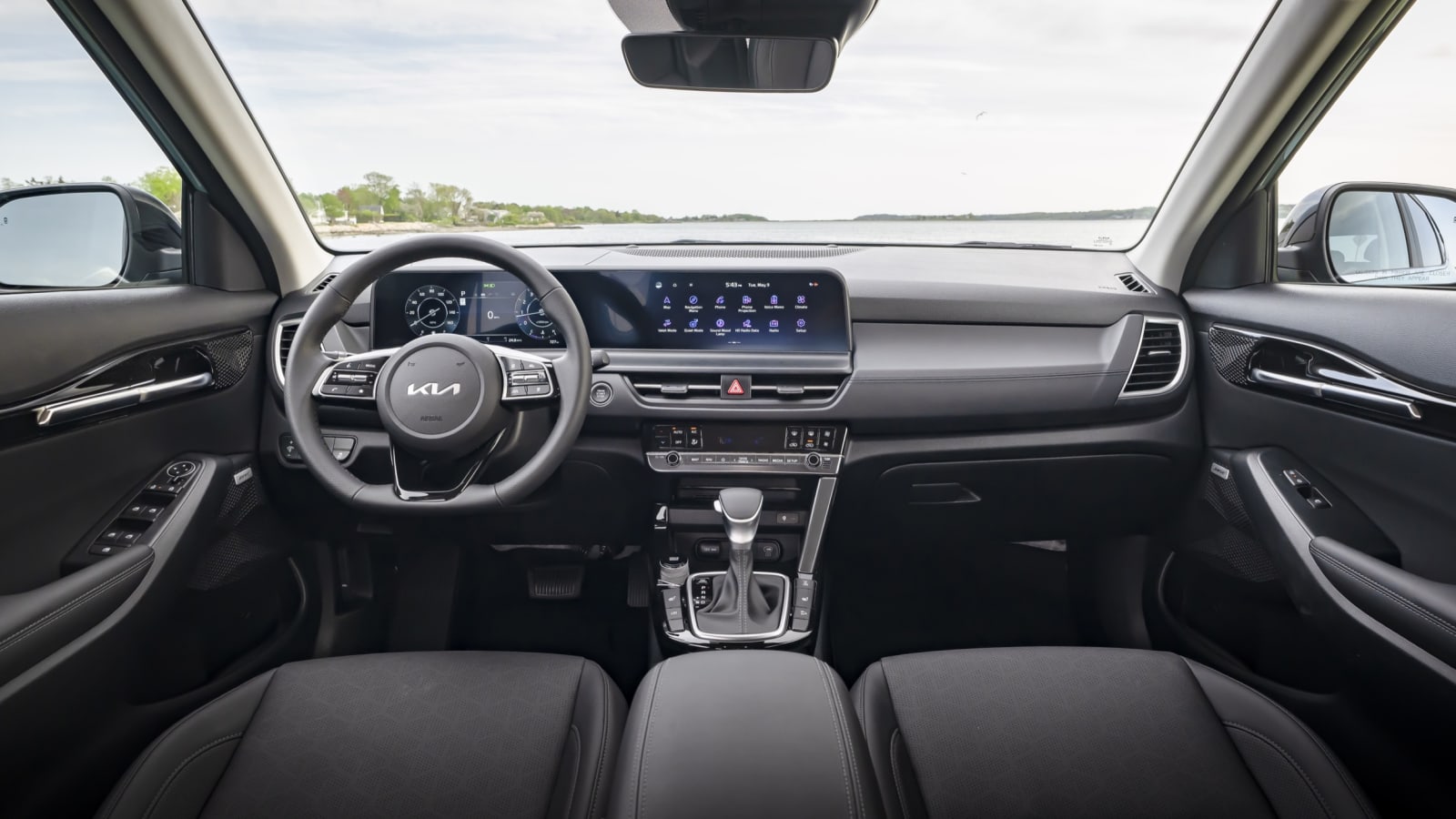
The updates continue with the powertrain. As before, a 2.0-liter four-cylinder comes standard, and it spins out 147 horsepower and 132 pound-feet of torque through a continuously variable transmission to all four wheels in the base Seltos LX. Front-wheel drive can be selected with the S trim or the mid-grade EX, where AWD is optional. The off-road-styled X-Line (which is new for 2024, replacing the previous Nightfall Edition) and top-level SX get standard AWD and a 1.6-liter turbocharged four-cylinder engine rated at 195 hp and a matching 195 lb-ft of torque.
Despite being on the market since 2021, we’ve never been able to drive a Kia Seltos with the base 2.0-liter engine. We’ve never loved the feel of continuously variable transmissions (CVTs), including Kia’s so-called IVT with simulated gear ratios in other models from the automaker, but we’d wager a guess that the base powertrain package could likely be described as “adequate” for a large number of the commuting-buyer population.
The turbo engine is the same size as what was offered for 2023, but for 2024 a bounty of small updates, along with some new ones and zeros in the engine’s software, mean it’s 20 horses mightier than it was last year. Also new for 2024 is an eight-speed automatic transmission. That’s up one gear compared to the previous version, and instead of a fancy dual-clutch design, the new unit relies on a tried-and-true torque converter.
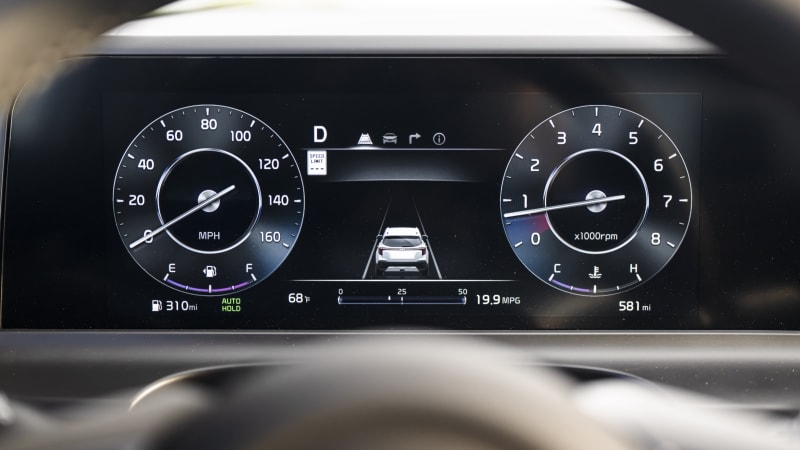
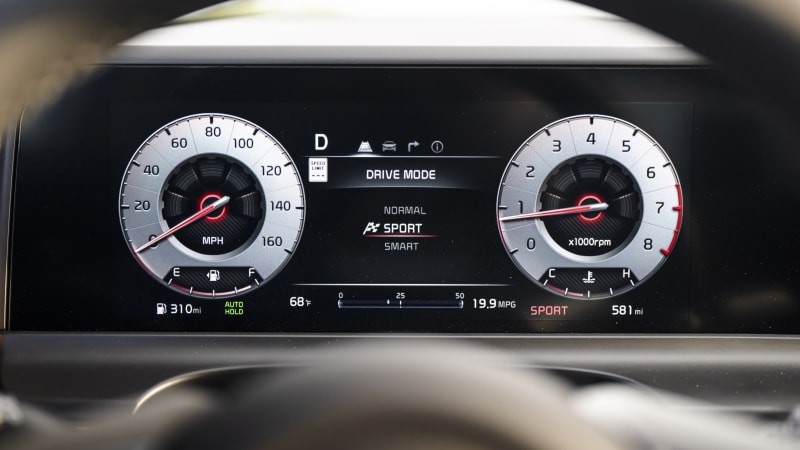
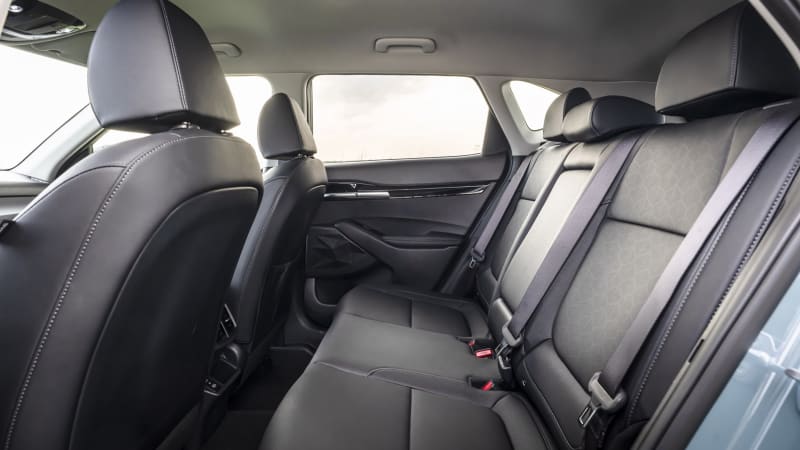
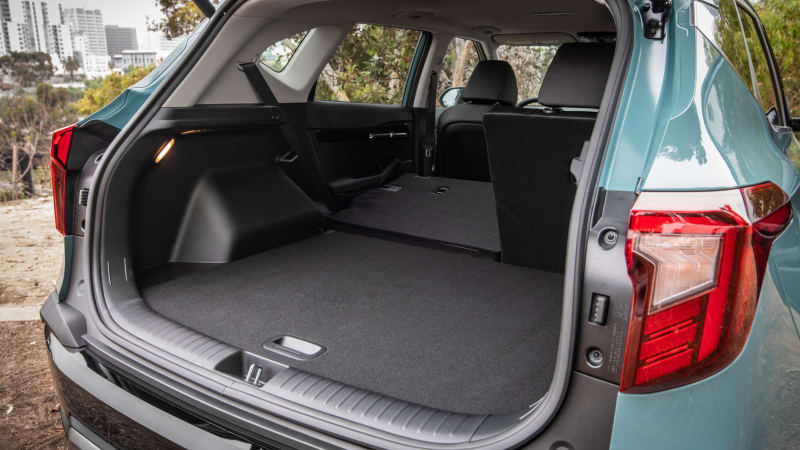
The new eight-speed auto works with zero hiccups, with smooth gear changes in normal driving but noticeable hesitation when a quick downshift is called upon for passing maneuvers — that’s its biggest dynamic demerit compared to the older DCT. Once the gear change does happen, power from the turbocharged engine feels plentiful for this small ‘ute, and certainly better than the popular Subaru Crosstrek, even with that model’s larger 2.5-liter engine option. The smaller Hyundai Kona (a corporate sibling to the Kia) offers an optional Seltos-matching 195 hp and still uses the dual-clutch transmission. If power is really your thing, the Mazda MX-30 offers as much as 250 horses (on premium gas) and stands out as the hot rod of the segment.
Another actual real-world issue that’s likely tied to both the increase in performance from the turbo engine and the move from the DCT to the conventional automatic is a reduction in fuel efficiency. The old turbo Seltos achieved 25 miles per gallon in the city, 30 on the highway and 27 combined. The new version scores lower at 25/27/26, respectively. In the real world, the EPA figures that the average driver will spend about a hundred dollars more per year to fuel the 2024 edition over the 2023 at today’s (May 2023) gas prices. The more mundane 2.0-liter model gets 29 city, 35 highway and 31 combined with front-wheel drive, or 27/31/29 with all-wheel drive.
Moving past the powertrain, the rest of the Seltos driving experience is basically the same as it ever was. It generally errs on the side of comfort over performance; its steering could be described as leisurely but direct, and its ride is softly sprung and well damped. There’s a noticeable change in its demeanor when Sport mode is engaged, but it never crosses into what we’d consider actual sportiness. That strikes us as appropriate considering the Seltos’ mission as an entry-level small crossover. Unlike parent company Hyundai’s N-badged line – including a Kona N – there’s no overtly sporty version occupying the Kia showroom. And that’s fine.
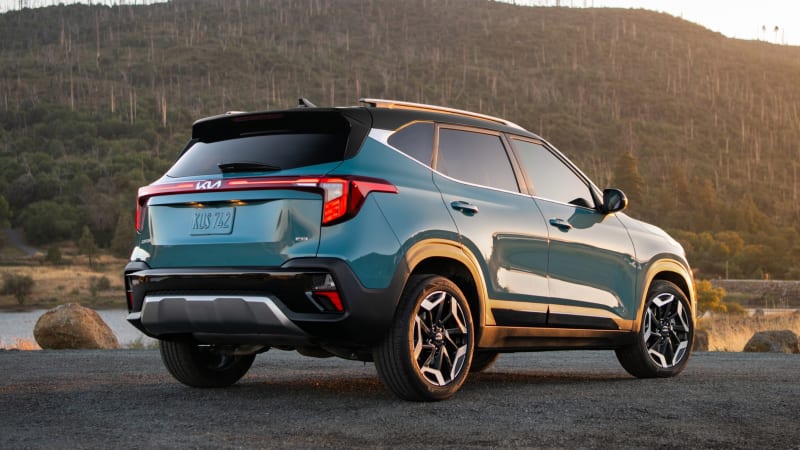
The 2024 Kia Seltos starts at $25,715 (including $1,325 for destination) and includes all-wheel drive. The step-up S loses standard all-wheel drive but gains the bigger digital screens inside for $26,315. Add AWD and the sticker rises to $27,815. The new X-Line runs $30,015, and the top-level SX that we tested starts at $31,315. Those prices are mostly up by a grand or two compared to the outgoing version, but still in the right ballpark for the Seltos’ midcompact class.
We consider the Kia Seltos one of the strongest offerings in its segment. That was true in 2023, and it remains true with the 2024 refresh. It was good, and it got better, as it’s supposed to (but doesn’t always) happen when a popular model is refreshed. It’s handsomely stylish, roomier and more comfortable than many of its biggest rivals, and is priced competitively. All in all, it’s a very compelling small crossover and exactly what we think a big swath of American buyers are clamoring for.







